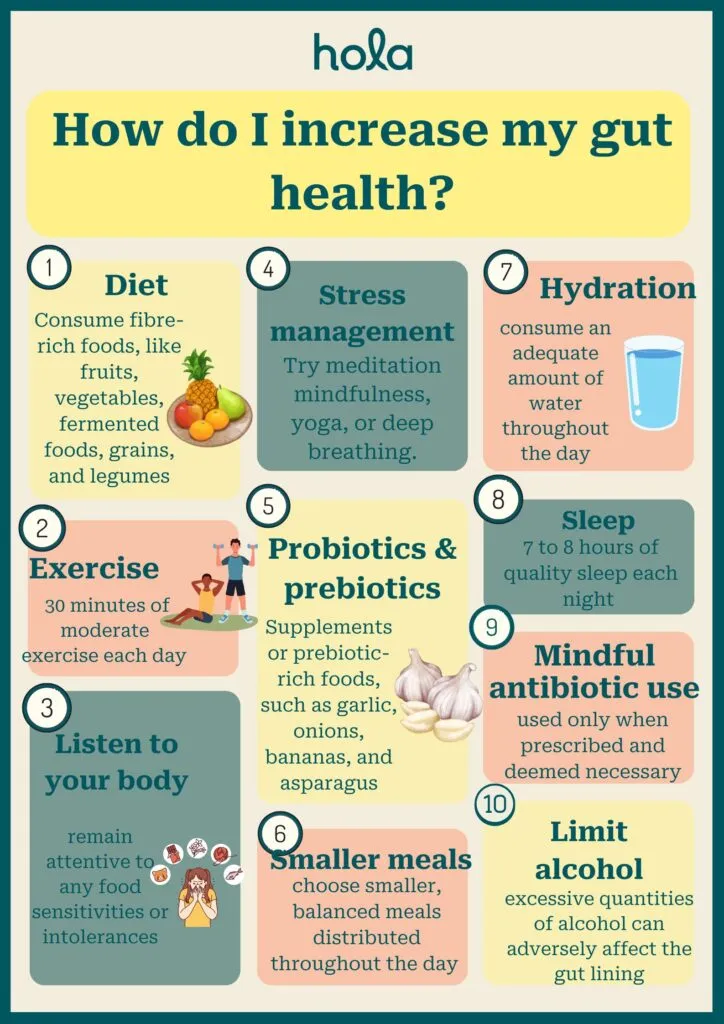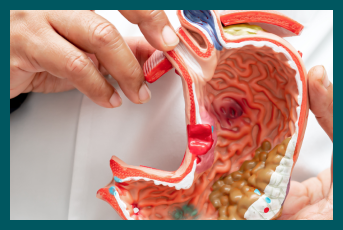How to improve gut health: Doctor-approved guide
Written by Dr Nelson Lau, MBBS FRACGP, GP & Digital Health Specialist. Originally published on 15 Feb 2025. Blog updated on 18 September, 2025.

Contents

Overview
Gut health is becoming a hot topic in Australia, and for good reason. A healthy gut supports digestion, immunity, mood, and even sleep. The good news is that even small, daily habits can make a big difference. Let us understand how gut health works and when to consult a doctor or when you would require an online referral to specialist for gut health.What is gut health?
Gut health refers to the delicate balance in the complex ecosystem of bacteria, viruses, and fungi in our digestive system (and there are many!), which makes up our microbiome. The good news is that small daily habits can make a big difference to our gut health.Why is gut health important?
Gut health is important for overall well-being, as this system significantly contributes to digestion, nutrient absorption, and immune system functioning. A properly functioning gastrointestinal system also has a substantial impact on mental health through its influence on the gut-brain connection, aiding in the regulation of mood and energy levels. Furthermore, it fosters a balanced microbiome, mitigating inflammation. Conversely, poor gastrointestinal health may result in digestive complications, a compromised immune response, and the development of chronic illnesses. Therefore, sustaining a balanced diet and engaging in a healthy lifestyle is imperative to preserve optimal gut health.Good bacteria vs bad bacteria
It's important to understand the concept that not all bacteria are "bad". Our gut is actually home to trillions of microbes, many of which help us with digesting our food and protecting us against illnesses, and reducing inflammation – these are the "good" bacteria. But when there is an imbalance and there is an abundance of "bad" bacteria, this can trigger things like abdominal bloating, diarrhoea, as well as other gut issues.Symptoms of an unhealthy gut?
Symptoms of an unhealthy gut can vary widely, but often may include:- Digestive complications include symptoms such as bloating, gas, diarrhoea, constipation, and heartburn.
- Inability to properly digest specific foods, resulting in discomfort.
- Fatigue or disturbances in sleep patterns can arise from compromised gut health. These can lead to interruptions in serotonin production and affect the quality of sleep.
- A weakened immune system due to recurrent illnesses or infections.
- Skin conditions, including acne, eczema, and other inflammatory disorders, may also be linked to gut health.
- Fluctuations in mood, anxiety, depression, and irritability have been correlated with the gut-brain axis.
- Unexplained weight fluctuations may occur, making it difficult for individuals to gain or lose weight despite maintaining a consistent diet and exercise regimen.
Experiencing these symptoms? Speak with a doctor within 15 minutes.
See a Doctor now
Available 24/7, across Australia.
Doctor-approved ways to improve gut health
- Eat more fibre – Wholegrains, legumes, fruits, and veggies feed the good bacteria. In Australia, most of us actually do not eat enough of these to satisfy our daily fibre intake.
- Try fermented foods – Foods like yoghurt, kimchi, sauerkraut, and kombucha are all packed with probiotics, which can help to balance your gut microbiome.
- Stay hydrated – Drinking enough water keeps things moving smoothly through your gut. Try to drink approximately 6–8 glasses of water a day, especially during our warmer Aussie months.
- Limit processed foods – Highly processed snacks often feed bad bacteria, so try to opt for fresh, whole foods when possible.
- Manage stress – Stress hormones can throw off your gut's balance. Go for a walk, take up meditation, or yoga, which can all help.
- Exercise regularly – Physical movement helps to support digestion as well as gut bacteria diversity. Even a daily walk around your suburb can make a difference.
- Use antibiotics wisely – Antibiotics are powerful and can wipe out both your good and bad bacteria. Only use them when prescribed and follow your doctor's advice.

When to consult a GP
If you have symptoms of bloating, stomach pain, diarrhoea, black stools, or unexplained weight loss, then it would be worth seeing a GP. In Australia, make a telehealth appointment with your GP first, who may then refer you to a gastroenterologist if needed.Why choose Hola health
At Hola Health, Doctors make it simple and convenient to take care of your gut health. Whether you're experiencing an ongoing digestive problem and looking for personalised medical suggestions, or just want reassurance, our experienced doctors are available through same-day telehealth consults. We can provide:- Professional advice on gut health symptoms and management.
- Medical certificates, prescriptions, or specialist referrals if needed.
- Convenient care from home, so you don't have to wait in a clinic when you're unwell.
FAQs
What are the top foods for gut health?
Foods that are rich in fibre, such as oats, lentils and veggies, are best. Fermented foods such as yoghurt, sauerkraut, and kefir can also help to strengthen your gut health.How long does it take to improve gut health?
Symptoms such as abdominal bloating can settle down in a few days. However, for lasting improvements to gut health, it can take weeks to months of sticking to consistent habits.Can probiotics alone fix gut issues?
Unfortunately, although probiotics can help, they are not a magic cure. Maintaining a balanced diet, lifestyle, and medical support is just as important.Is coffee good or bad for gut health?
Australia has a strong coffee culture, and unfortunately, even though coffee can stimulate digestion and has antioxidants, too much of it can also cause reflux or loose stools. So it's best to enjoy your coffee in moderation.What's the difference between gut health and digestive health?
Gut health is about the health of your microbiome, which is the balance of the bacteria and microbes in your digestive system. Digestive health is about how well your body breaks down and absorbs the food you eat.Does stress really affect gut health?
Yes, stress can definitely alter gut bacteria and slow down digestion, which can then lead to bloating or constipation. So it is important to also take care of your mental as well as your bodily health.How can I improve gut health quickly at home?
Simple first steps, such as taking more fibre, drinking enough water, and getting physical exercise daily, will all help. You can even start by swapping out one processed snack for fresh fruit instead.When should I see a doctor about gut problems in Australia?
If your symptoms persist for more than a few weeks, recur, or are severe, you should see a doctor. Using telehealth services where available can also allow you to have quicker access.Need time off to recover? Get your medical certificate online within 15 minutes.
Request a medical certificate
Available 24/7, across Australia.
What we treat
- Cough
- Nausea & vomiting
- Fever
- Hayfever
- Fatigue
- Sore throat
- Acne
- Hair loss
- Gout
- Eczema
- Rosacea
- Sunburn
- UTI
- Erectile dysfunction
- Contraception
- Morning sickness
- Morning after pill
- Prostate health
- Anxiety
- Depression
- Stress
- Grief & loss
- Antidepressants
- Premature ejaculation
- Asthma
- Blood pressure
- Blood thinners
- Diabetes
- Cholesterol
- Migraines & headaches
- Allergies
- Body ache
- Heartburn & reflux
- Sleep disorder
- Pain relief
- Gastro
Related Articles
Disclaimer
This blog is for general informational purposes only and does not indicate that Hola Health provides all treatments or preventive measures mentioned. It is not intended to be a substitute for professional medical advice. Always seek the guidance of your doctor or other qualified health professional with any questions you may have regarding your health or a medical condition. For emergencies please immediately contact 000. Any medical topics discussed are intended to educate, not to imply availability through Hola Health.
 Facebook
Facebook  X
X  Copy Link
Copy Link



